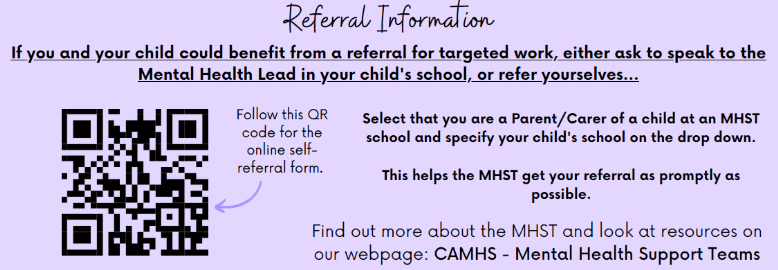Mental Health & Wellbeing
At Pinewood, we believe in promoting positive mental health and emotional wellbeing to ensure that the school is a community where everyone can thrive.
Meet our Mental health and Wellbeing Team at Pinewood;

 What is nurture and Wellbeing?
What is nurture and Wellbeing?
At Pinewood we use expertise in supporting children's emotional wellbeing through our Nurture offer. We aim to support children in a safe and caring environment, helping children to reach their potential socially and emotionally. Nurture offers an opportunity to help children understand possible barriers and supporting their emotional development, helping them cope with different challenges.
When working with Nurture it can support with;
Loss and bereavement
Self-esteem
Social skills
Friendship concerns
Anxiety/worry
Conflict
Emotional regulation
Growth Mindset
Problem solving
How long would a Nurture intervention last?
This can be done as one to one session or a group session; weekly
The usual intervention would last between 6-8 weeks.
Parent Communication
This will be done through the class teacher, nurture support; Mts Sibley or the SENCO Mrs Symmons. This might be face to face or via the telephone, email or class Dojo.
Referrals
These can be requested by discussing with class teacher, Mrs Sibley or SENCO Mrs Symmons or via the link directly to NHS MHST.

Meet our Wellbeing Champions...
Our Wellbeing champions at Pinewood are
voted for by their class peers and once chosen, they wear their 'Wellbeing' badge so that peers can seek support or help from our champions. Our Wellbeing Champions help make decisions on mental health days, support assemblies and encourage all pupils to share in our Pinewood Values.
What is mental health?
The World Health Organisation defines mental health as a state of wellbeing in which every individual achieves their potential, copes with the normal stresses of life, works productively and fruit fully, and is able to make a contribution to their community. Mental health includes our emotional, psychological and social wellbeing. It affects how we think, feel and act. Good mental health and wellbeing is just as important as good physical health. Like physical health, mental health can range across a spectrum and can fluctuate on a daily basis and change over time.
fully, and is able to make a contribution to their community. Mental health includes our emotional, psychological and social wellbeing. It affects how we think, feel and act. Good mental health and wellbeing is just as important as good physical health. Like physical health, mental health can range across a spectrum and can fluctuate on a daily basis and change over time.

What happens here at Pinewoo d?
d?
In school, we teach children about what it means to have good mental health and wellbeing throughout our curriculum. Our PSHE learning focuses specifically on developing children’s social and emotional skills which can prevent poor mental health from developing and help all children cope effectively with setbacks and remain healthy. It is about helping children to understand and manage their thoughts, feelings and behaviour and build skills that help them to thrive through our values such as; kindness, resilience, independence and self-belief.
What if my child is experiencing difficulties with their mental health and wellbeing?
Mental health doesn’t mean being happy all the time yet neither does it mean avoiding stresses altogether. One of the most important ways to help your child is to listen to them and take th eir feelings seriously. In many instances, children and young people’s concerns and worries usually pass with the support of their parents and families. It is helpful for the school to know what they are going through at these times, so that staff can be aware of the need and support this. Coping and adjusting to setbacks are critical life skills for children, just as they are for adults, but it is important that they are nurtured to develop positive coping strategies. If you are ever worried about your child’s mental health and wellbeing then, just as you would about any concerns that you have about their learning, come and talk to us. Sometimes children will need additional support for a short period – this may be in the form of a daily check-in with a trusted adult, time to talk through what they are feeling and support in developing ways of moving forwards with this.
eir feelings seriously. In many instances, children and young people’s concerns and worries usually pass with the support of their parents and families. It is helpful for the school to know what they are going through at these times, so that staff can be aware of the need and support this. Coping and adjusting to setbacks are critical life skills for children, just as they are for adults, but it is important that they are nurtured to develop positive coping strategies. If you are ever worried about your child’s mental health and wellbeing then, just as you would about any concerns that you have about their learning, come and talk to us. Sometimes children will need additional support for a short period – this may be in the form of a daily check-in with a trusted adult, time to talk through what they are feeling and support in developing ways of moving forwards with this.
Looking after yourself
If things are getting you down, it’s important to recognise this. Talk to someone you trust and see what they think. It is easy to go on struggling with very difficult situations because you feel that you should be able to cope and don’t deserve any help. Come and talk to us in confidence and let us know when things are tough. As much as you try to hide how you are feeling from your child, they will notice even the smallest changes. Asking for some support from your family, a friend or your doctor for a referral to a counselling service is a sign of strength. You can’t help your child if you are not being supported yourself
and see what they think. It is easy to go on struggling with very difficult situations because you feel that you should be able to cope and don’t deserve any help. Come and talk to us in confidence and let us know when things are tough. As much as you try to hide how you are feeling from your child, they will notice even the smallest changes. Asking for some support from your family, a friend or your doctor for a referral to a counselling service is a sign of strength. You can’t help your child if you are not being supported yourself
Below are some signposts to useful websites that you may find helpful:
Please click the below links to access more helpful information:
Anna Freud: https://www.annafreud.org/parents-and-carers/
Be U: https://www.beusupport.co.uk/
CASY: https://www.casy.org.uk/about-us/what-we-do/
NCC: https://www.nottinghamshire.gov.uk/care/adult-social-care/mental-health-wellbeing
NHS: https://www.nhs.uk/every-mind-matters/supporting-others/childrens-mental-health/
Young Minds: https://www.youngminds.org.uk/






